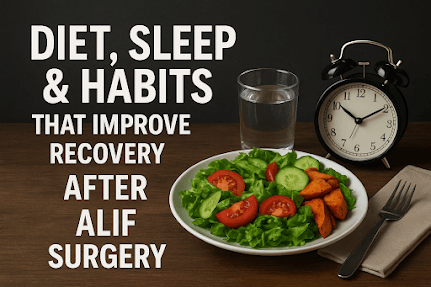Recovering after ALIF surgery requires a complete approach that supports healing from the inside out. The combination of the right diet, proper sleep routine, and healthy lifestyle habits can significantly reduce discomfort, speed up tissue repair, and help the spine stabilize naturally. A structured recovery plan gives the body the energy and strength it needs to rebuild bone, improve mobility, and restore normal function without complications.
Why Nutrition Matters in Healing
Nutrition is a major pillar in postoperative recovery, supplying your body with essential nutrients that repair tissues, strengthen muscles, and rebuild spinal stability.
Best Foods for Faster Healing
Lean Proteins: Support tissue repair, muscle strength, and overall recovery. Options include chicken, fish, eggs, tofu, and legumes.
High-Fiber Foods: Prevent constipation caused by medications and limited mobility. Choose whole grains, fruits, vegetables, and beans.
Healthy Fats: Reduce inflammation and support cell repair. Include avocados, nuts, seeds, and olive oil.
Hydration: Drinking water supports digestion, reduces swelling, and improves circulation for faster healing.
Foods to Avoid
• Processed snacks and sugary foods
• Excessive caffeine
• Fried items
• Alcohol
These increase inflammation, delay healing, and strain the digestive system.
The Importance of Quality Sleep for Recovery
Sleep plays a powerful role in restoring physical strength and reducing stress on the healing spine. Good rest helps the body repair tissues, regulate hormones, and improve immune function.
How Sleep Boosts Post-Surgery Healing
• Supports release of growth hormones
• Reduces inflammation naturally
• Strengthens the immune response
• Relaxes muscles and nerves
Tips for Better Sleep
• Maintain a consistent bedtime
• Use supportive pillows for the lower back
• Keep electronic devices away before bed
• Practice deep breathing to reduce discomfort
Habits That Speed Up Recovery
Developing daily habits that protect the spine and enhance mobility is essential for safe and smooth healing.
Positive Daily Habits
Gentle Movement: Walking increases blood flow and prevents stiffness.
Correct Posture: Keeps pressure off the lower back and reduces pain.
Avoid Heavy Lifting: Protects the surgical area from strain.
Follow Physiotherapy Exercises: Improves strength, flexibility, and spinal alignment.
Quit Smoking: Enhances blood circulation and promotes bone healing.
Lifestyle Adjustments for Long-Term Wellness
• Use ergonomic furniture
• Take frequent breaks from sitting
• Maintain a balanced weight
• Monitor pain levels and communicate with your surgeon
Conclusion
A balanced diet, restful sleep, and consistent healthy habits are essential for restoring strength and boosting healing after surgery. Small daily choices create smoother and safer recovery progress.


Recent Comments